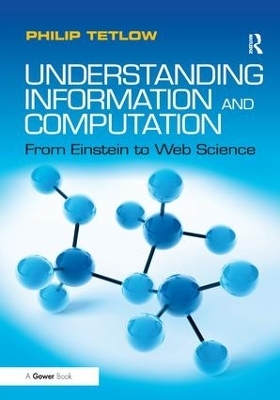
Understanding Information and Computation
Routledge (Verlag)
978-1-4094-4039-0 (ISBN)
The World Wide Web is truly astounding. It has changed the way we interact, learn and innovate. It is the largest sociotechnical system humankind has created and is advancing at a pace that leaves most in awe. It is an unavoidable fact that the future of the world is now inextricably linked to the future of the Web. Almost every day it appears to change, to get better and increase its hold on us. For all this we are starting to see underlying stability emerge. The way that Web sites rank in terms of popularity, for example, appears to follow laws with which we are familiar. What is fascinating is that these laws were first discovered, not in fields like computer science or information technology, but in what we regard as more fundamental disciplines like biology, physics and mathematics. Consequently the Web, although synthetic at its surface, seems to be quite 'natural' deeper down, and one of the driving aims of the new field of Web Science is to discover how far down such ’naturalness’ goes. If the Web is natural to its core, that raises some fundamental questions. It forces us, for example, to ask if the central properties of the Web might be more elemental than the truths we cling to from our understandings of the physical world. In essence, it demands that we question the very nature of information. Understanding Information and Computation is about such questions and one possible route to potentially mind-blowing answers.
Dr Philip Tetlow, CEng, FIET is a Certified IT Architect, Web Scientist and one time W3C member. He is a Senior Certified Executive IT Architect and member of the Technical Consultancy Group in IBM’s Global Business Services division. Dr Tetlow has many years’ experience of delivering large complex IT systems and has specialised in Web related architectures for nearly a decade. He has presented on Web Science at the Royal Society, London, and is a Visiting Fellow at the University of York, UK. Dr Tetlow is the author of the 2007 book The Web's Awake, which was arguably the first ever book on what is now known as web science.
Contents: Foreword, Yorick Wilks; Foreword. L.J. Rich; Preface; Introduction; Dot-to-dots point the way; Hitler, Turing and quantum mechanics; A different perspective on numbers, straight lines and other such mathematical curiosities; Twists, turns and nature's preference for curves; Curves of curves; To process or not?; Information and computation as a field; Why are conic sections important?; The gifts that Newton gave, Turing opened and which no chapter one has really appreciated yet; Einstein's torch bearers; Special relativity; General relativity; Beyond the fourth dimension; Time to reformulate with a little help from information retrieval research; Supporting evidence; Where does this get us?; References; Index.
| Verlagsort | London |
|---|---|
| Sprache | englisch |
| Maße | 174 x 246 mm |
| Gewicht | 453 g |
| Themenwelt | Mathematik / Informatik ► Informatik ► Theorie / Studium |
| Wirtschaft ► Betriebswirtschaft / Management ► Wirtschaftsinformatik | |
| ISBN-10 | 1-4094-4039-7 / 1409440397 |
| ISBN-13 | 978-1-4094-4039-0 / 9781409440390 |
| Zustand | Neuware |
| Haben Sie eine Frage zum Produkt? |
aus dem Bereich


